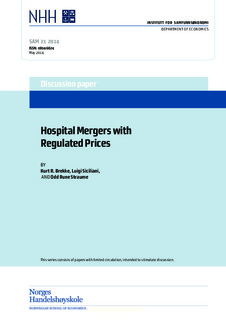Hospital mergers with regulated prices
Working paper

View/
Date
2014-05Metadata
Show full item recordCollections
- Discussion papers (SAM) [655]
Abstract
We study the effects of a hospital merger using a spatial competition framework with semialtruistic
hospitals that invest in quality and expend cost-containment effort facing regulated
prices. We find that the merging hospitals always reduce quality, whereas non-merging hospitals
respond by increasing (reducing) quality if qualities are strategic substitutes (complements). A
merger leads to higher average treatment cost efficiency and, if qualities are strategic substitutes,
might also increase average quality in the market. If a merger leads to hospital closure, the
resulting effect on quality is positive (negative) for all hospitals in the market if qualities are
strategic substitutes (complements). Whether qualities are strategic substitutes or complements
depends on the degree of altruism, the effectiveness of cost-containment effort, and the degree of
cost substitutability between quality and treatment volume.